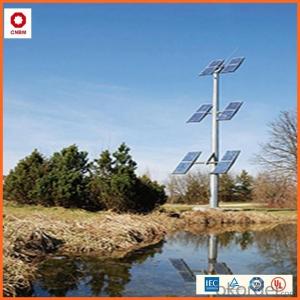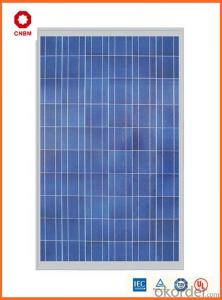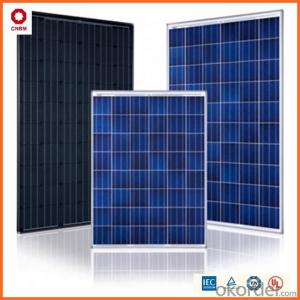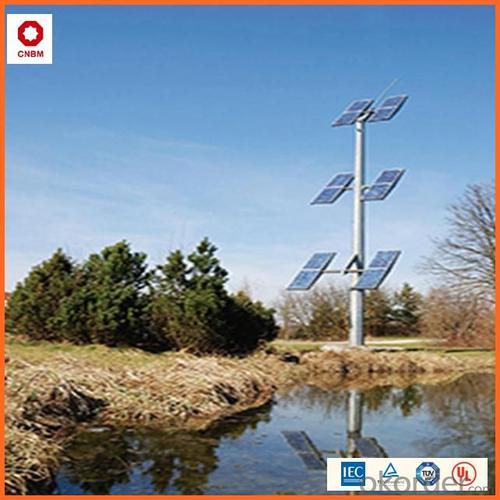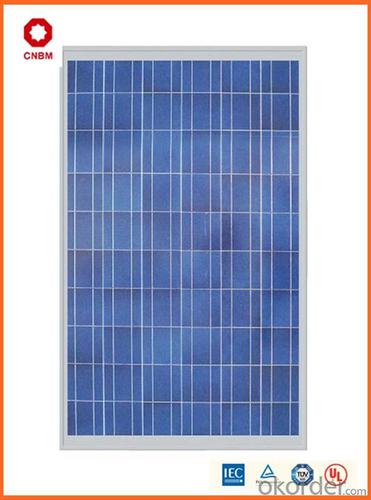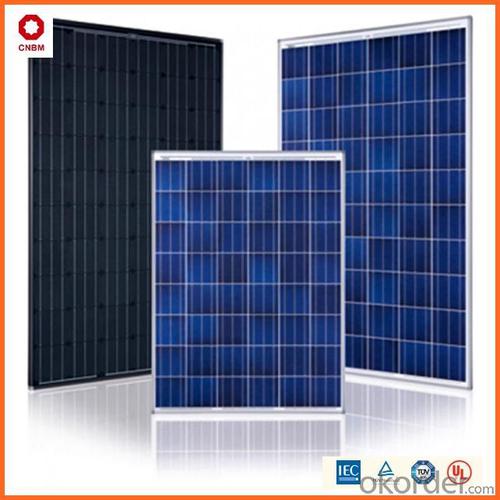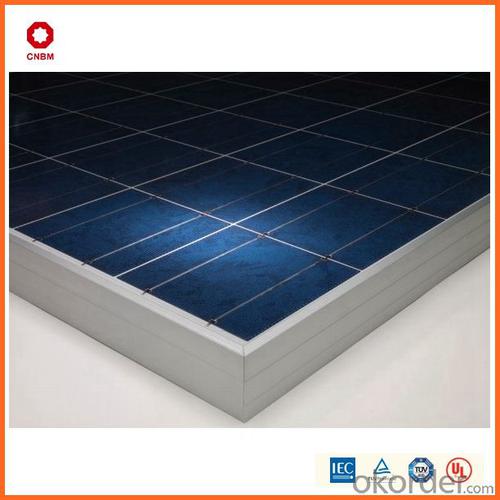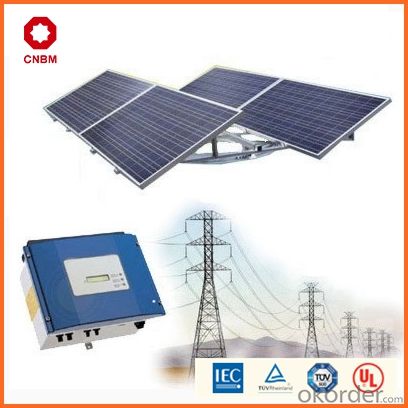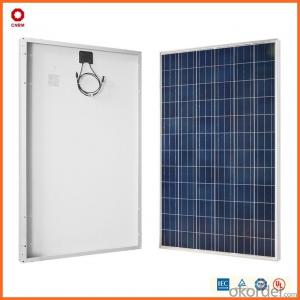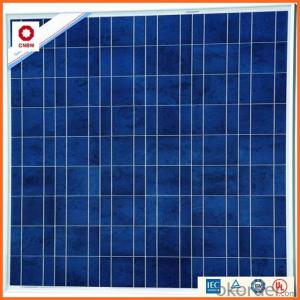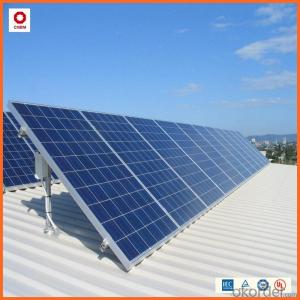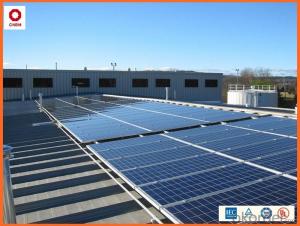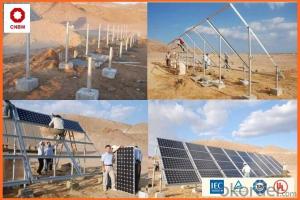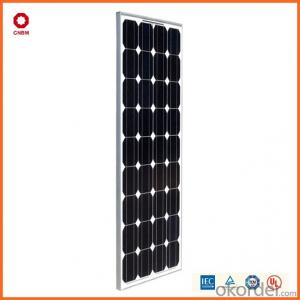Ecs Solar Energy Systems - 25w Small Solar Panels in Stock China Manufacturer
- Loading Port:
- China main port
- Payment Terms:
- TT OR LC
- Min Order Qty:
- 10 watt
- Supply Capability:
- 10000000 watt/month
OKorder Service Pledge
OKorder Financial Service
You Might Also Like
Specification
Product Description:
Hot Sale !!! Quality and Safety of Small Poly Solar Panel 5w~150w
1. Rigorous quality control meets the highest international standards.
2. High-transmissivity low-iron tempered glass, strong aluminium frame.
3. Using UV-resistant silicon.
4. IS09001/14001/CE/TUV/UL
Warranties of Small Poly Solar Panel 35~85w
1. 10 years limited product warranty
2. 15 years at 90% of the minimal rated power output
3. 25 years at 80% of the minimal rated power output
Specification
Characteristics of Poly solar panels CNBM (245-320W) | |||||
Max Power Voltage Vmp(V) | 30.3 | 30.8 | 31.1 | 31.4 | 31.85 |
Max Power Current Imp(A) | 7.60 | 7.64 | 7.73 | 7.81 | 7.85 |
Open Circuit Voltage Voc(V) | 36.1 | 36.6 | 37 | 37.3 | 37.68 |
Short Circuit Current Isc(A) | 8.50 | 8.55 | 8.65 | 8.75 | 8.85 |
Max Power Pm(W) | 230W | 235W | 240W | 245W | 250W |
Temperature Coefficient of Cells Poly solar panels CNBM (245-320W) | |
NOCT | 45± 2 |
Temperature Coeffucients of Isc | 0.0492 |
Temperature Coeffucients of Voc | -0.3374 |
Temperature Coeffucients of Voc | -0.4677 |
Mechanical Data of Poly solar panels CNBM (245-320W) | |
Dimension | 1638 × 982 × 40 mm |
Weight | 19.5 kg |
No. of Cells and Connections | 60 (6 ×10) |
Tolerance | 0 ~ + 5 W |
Cell | Monocrystalline Cell 156 × 156 mm |
Packing | 624 Pcs/40ft(H) Container |
Limits of Poly solar panels CNBM (245-320W) | |
Operating Temperature | -40 to +85 |
Storage Temperature | -40 to +85 |
Max System Voltage | 1000VDC(IEC) / 600VDC(UL) |
Features of our products:
• High conversion efficiency mono/poly-crystalline amorphous silicon solar cells
• Modules incorporate high performance bypass diodes to minimize the power drop caused by shading
• High transmittance, low-iron tempered glass
• High performance EVA encapsulant to prevent destroying and water.
• AI frame: without screw, corner connection. 8 holes on the frame can be installed easily
• Good performance of preventing from atrocious weather such as wind and hails
• Certifications: CE IEC TUV VDE UL, Class I
• 10 years 90% power output warranty

Shipping of Small Poly Solar Panel 35~85w
By Sea | Delivery from Shanghai or Ningbo seaport |
By Air | Departure from Shanghai Pudong Airport |
By Express | Post by DHL, EMS, UPS, TNT. |
Features of our products:
• High conversion efficiency mono/poly-crystalline amorphous silicon solar cells
• Modules incorporate high performance bypass diodes to minimize the power drop caused by shading
• High transmittance, low-iron tempered glass
• High performance EVA encapsulant to prevent destroying and water.
• AI frame: without screw, corner connection. 8 holes on the frame can be installed easily
• Good performance of preventing from atrocious weather such as wind and hails
• Certifications: CE IEC TUV VDE UL, Class I
• 10 years 90% power output warranty
As a professional Solar Panel manufacturer and Supplier in China, we have our customers come around the whole world and our specialization has got a worldwide recognition. Meanwhile, with our superior quality, competitive price, prompt and excellent service, As main role in trade section of CNBM Group, CNBM International Corporation supplies products including Monocrystalline Solar Panel, Polycrystalline Solar Panel ( multicrystalline silicon Solar Panel) have received and enjoyed famous reputation in many countries and regions in the world.
- Q: Can solar energy systems be used in areas with strict building codes?
- Yes, solar energy systems can be used in areas with strict building codes. While building codes may impose certain limitations or requirements on the installation and design of solar energy systems, there are various ways to comply with these regulations. For instance, the design can be adapted to meet aesthetic and structural requirements, and permits can be obtained to ensure compliance with safety and building standards. Additionally, many jurisdictions have incorporated provisions that facilitate the installation of solar energy systems, recognizing their environmental and energy-saving benefits. Overall, with proper planning, consultation with local authorities, and adherence to building codes, solar energy systems can be successfully implemented in areas with strict regulations.
- Q: Can solar energy systems be used for powering residential or commercial air conditioning systems?
- Indeed, residential or commercial air conditioning systems can be powered by solar energy systems. Solar energy, whether harnessed through the utilization of solar panels or solar thermal systems, can be converted into electricity to fuel air conditioning units. The functioning of solar panels involves the capture of sunlight, which is then transformed into direct current (DC) electricity. Subsequently, an inverter converts this DC electricity into alternating current (AC) electricity, enabling it to power various appliances, including air conditioning systems. Alternatively, solar thermal systems utilize the sun's heat to directly power air conditioning units. This is accomplished by heating a fluid, such as water or refrigerant, which is then employed to cool the air. By opting for solar energy systems to power air conditioning, not only can electricity bills be reduced, but carbon emissions can also be minimized, making this an environmentally sustainable and economically viable solution for both residential and commercial structures.
- Q: What is the maintenance schedule for a solar energy system?
- The maintenance schedule for a solar energy system typically involves regular cleaning of the panels, checking for any damage or debris, and inspecting the system's overall performance at least once a year. Additionally, it is important to monitor and maintain the batteries, inverters, and other components as needed.
- Q: Are there any health risks associated with solar energy systems?
- No, there are no significant health risks associated with solar energy systems. Solar energy is clean and emits no harmful pollutants, unlike fossil fuels which contribute to air pollution and respiratory problems. However, it is important to follow proper installation and maintenance procedures to ensure safety and prevent accidents.
- Q: Can solar energy systems be used for powering data centers or IT infrastructure?
- Yes, solar energy systems can definitely be used for powering data centers or IT infrastructure. Solar panels can generate electricity from sunlight, which can then be used to power various electrical components in data centers like servers, cooling systems, and networking equipment. Additionally, advancements in solar technology have made it possible to store excess solar energy in batteries, ensuring a continuous power supply even during cloudy periods or at night. This not only reduces reliance on traditional power sources but also helps in reducing carbon emissions and overall energy costs for data centers.
- Q: Can solar energy systems be integrated into existing electrical systems?
- Yes, solar energy systems can be integrated into existing electrical systems. By installing solar panels on rooftops or other suitable locations, the generated electricity can be fed into the existing electrical system, reducing the reliance on traditional sources of electricity and potentially lowering energy costs. However, it is important to ensure the compatibility and capacity of the existing electrical infrastructure to handle the additional power supply from the solar energy system.
- Q: Can solar energy systems be used for desalination of water?
- Yes, solar energy systems can be used for desalination of water. Solar-powered desalination systems use solar energy to power the desalination process, typically through the use of photovoltaic (PV) panels or solar thermal collectors. These systems can convert seawater or brackish water into fresh water by harnessing the sun's energy to heat, evaporate, and condense the water, leaving behind the salt and other impurities. Solar desalination offers a sustainable and environmentally friendly solution to address water scarcity in areas with abundant sunlight.
- Q: What are the environmental impacts of manufacturing solar panels?
- The manufacturing of solar panels has some environmental impacts, primarily during the production phase. These impacts include energy consumption, greenhouse gas emissions, and the use of certain materials. However, it is important to note that solar panels have a significantly lower environmental impact compared to conventional energy sources in their lifecycle. Additionally, ongoing efforts are being made to reduce the environmental footprint of solar panel manufacturing through technological advancements and sustainable practices.
- Q: Can a solar energy system power an entire home?
- A whole home can be powered by a solar energy system. With advancements in solar technology, generating enough electricity from solar panels to meet the energy needs of a typical household is now possible. The system consists of solar panels that convert sunlight into electricity, an inverter that transforms the DC electricity generated by the panels into AC electricity for use in the home, and a battery storage system to store excess energy for use during periods of low sunlight or cloudy weather. The size and capacity of the solar energy system will vary depending on the energy requirements of the home. Factors such as the number of people living in the house, energy consumption habits, and the amount of sunlight in the area will determine the number of solar panels needed. Conducting a comprehensive energy audit is crucial to determine the appropriate system size. By installing a solar energy system, homeowners can greatly reduce or eliminate their reliance on the traditional electrical grid. In some cases, surplus electricity generated by the system can be sold back to the grid, resulting in potential cost savings. Moreover, solar energy is a clean and renewable source of power, which reduces carbon emissions and benefits the environment. However, it is important to note that various factors, including the location and orientation of the panels, the amount of sunlight available, and the weather conditions, can affect the efficiency and effectiveness of a solar energy system. Therefore, it is advisable to consult a professional solar installer to design and install a system that meets the specific needs of the home.
- Q: Can solar energy systems be used for powering electric vehicle public transportation systems?
- Yes, solar energy systems can be used to power electric vehicle public transportation systems. Solar panels can be installed on the roofs of charging stations or directly on the vehicles themselves to generate electricity from sunlight. This renewable energy can then be used to charge the electric vehicles, reducing the reliance on non-renewable energy sources and decreasing the carbon footprint of public transportation systems.
Send your message to us
Ecs Solar Energy Systems - 25w Small Solar Panels in Stock China Manufacturer
- Loading Port:
- China main port
- Payment Terms:
- TT OR LC
- Min Order Qty:
- 10 watt
- Supply Capability:
- 10000000 watt/month
OKorder Service Pledge
OKorder Financial Service
Similar products
Hot products
Hot Searches
Related keywords
